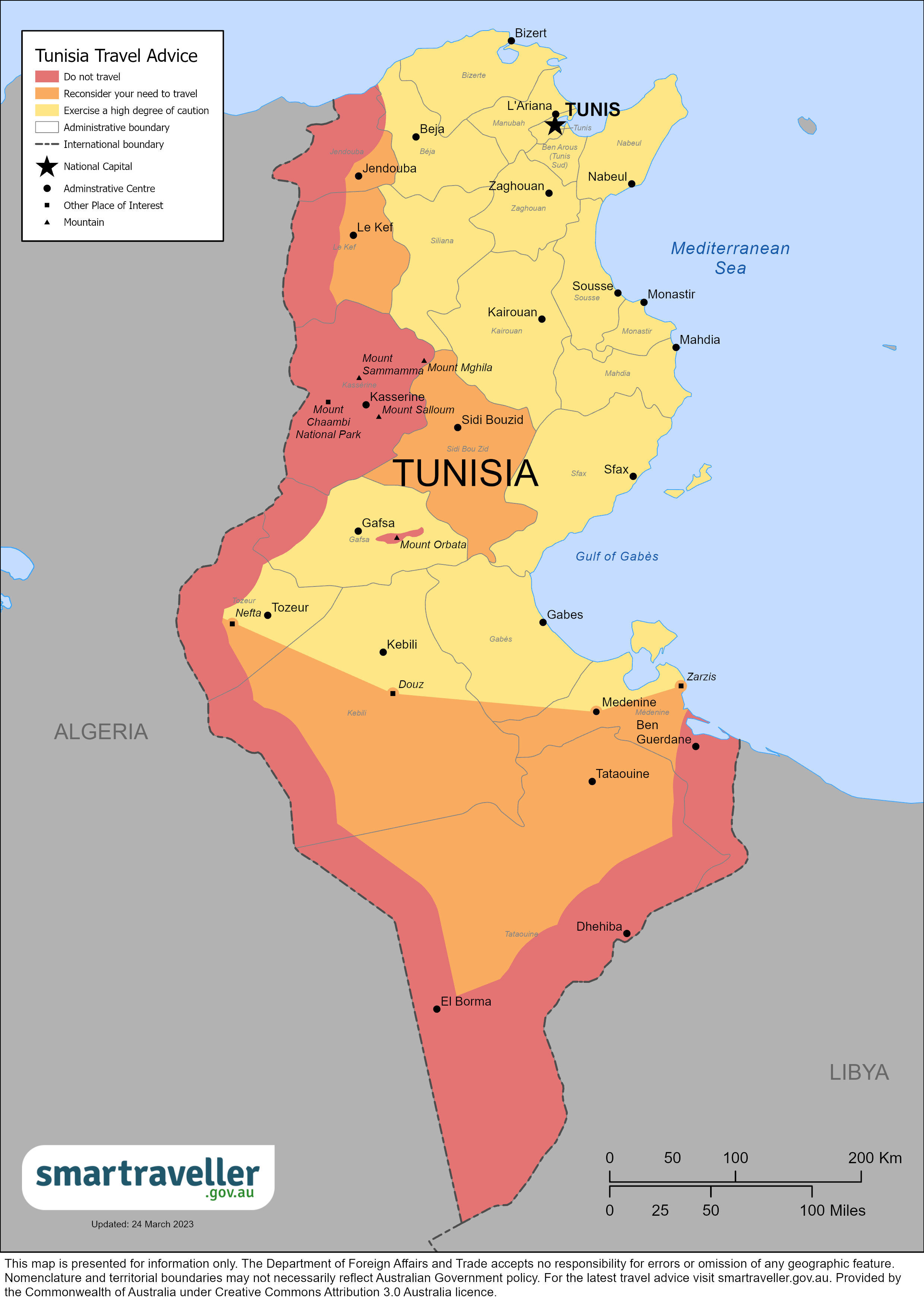Local restrictions
Health measures are subject to change at short notice. Follow the guidance of local authorities, as rules may vary by governorate.
Strikes, protests and demonstrations
Strikes can occur with little or no notice and can affect essential services, including ground and air transport. Avoid protests and demonstrations and follow the advice of local authorities. Check with your travel provider whether your travel arrangements are affected.
Border crossings
There’s a heightened security presence at border crossings due to the deteriorating security environment in Libya and Algeria.
Crossings may close at short notice. Tunisian security forces control access.
Consult with local authorities and read the travel advisories for Algeria and Libya before deciding whether to travel.
Travel to desert areas
Higher travel advice levels apply in Tunisia, read our advice levels for Tunisia before travelling to desert areas. Read ‘Travel advice explained‘ for more information on what each advice level means.
You need permission from Tunisian authorities to travel to certain desert areas in the south. You must have a licensed guide.
Before travelling into the Sahara, the National Guard’s Tourism Brigade recommends you register your travel details at their offices in Douz, Tozeur or Tataouine.
An experienced guide may reduce the risks associated with travel in the Sahara.
Driving permit
To drive in Tunisia you need an International Driver’s Permit (IDP).
You must obtain your IDP before leaving Australia.
For longer stays, contact the Ministry of Transport (French) about local licences.
Road travel
You’re more likely to die in a motor vehicle accident in Tunisia than in Australia.
Driving in Tunisia can be hazardous due to:
- poorly maintained vehicles
- poor local driving practices
- poor road lighting
- bicycles, mopeds, and motorcycles without lights or reflectors
- animals on the road in rural areas
Locals often ignore:
- traffic signs and signals
- pedestrian crossings and stoplights
- lane markings
If you plan to drive in Tunisia:
- learn the local road rules
- make sure your vehicle has all required safety equipment
- avoid driving outside cities after dark
Military or police security checks on roads are common.
If you encounter a security check:
- approach checkpoints slowly
- don’t cross boundaries without permission
- be prepared to show photo ID if asked
More information:
Motorcycles
Avoid using motorcycles due to poor road safety standards.
Your travel insurer may not cover you when riding a motorcycle.
Always wear a helmet. Make sure your passenger does too.
Taxis
Taxis touting for business outside the airport, hotels and tourist attractions often try to charge high prices.
If you need to travel by taxi:
- use licensed taxis or reputable limousine services
- get your hotel to make a booking
- make sure the driver uses the meter.
Public transport
Buses can be crowded. Petty crime occurs on buses.
TRANSTU, the Tunis Transport Company, manages buses and the light railway in Tunis.
The national transport company SNTRI and Trans-Tour buses travel to remote areas of Tunisia.
More information:
Rail travel
The railway network connects:
- major cities in the north, including Tunis, Bizerte and Beja
- east coast towns of Sfax and Gabes
Petty crime occurs on city and inter-city trains. Always take care of your belongings.
Sea travel
Regular ferry services operate between:
- Sfax and the Kerkennah islands
- El-Jorf and Ajim on Djerba Island
International cruise ship services visit Tunis and other towns.
More information:
Air travel
DFAT doesn’t provide information on the safety of individual commercial airlines or flight paths.
Check the Aviation Safety Network website for details on aviation safety in Tunisia.
Security screening at Tunis-Carthage International Airport has increased.
More information:

